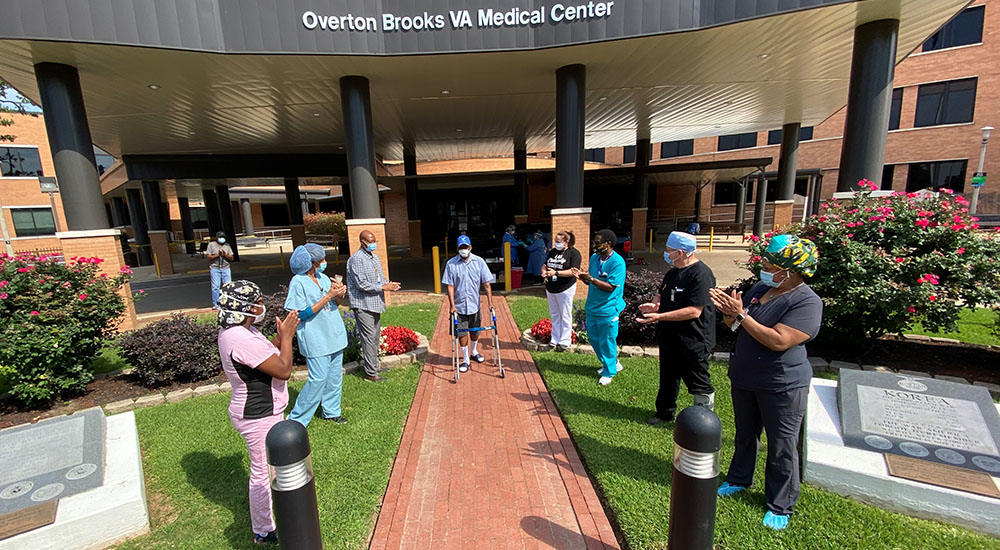Robert Colleton, a 66-year-old Air Force Veteran, spent weeks on a ventilator and in an induced coma. Marine Corps Veteran Michael Novielli is 71. Novielli was in the hospital for 13 days, on oxygen and antibiotics and lost 40 pounds. They are just two of the thousands of Veterans who know first-hand how dangerous COVID-19 can be for older Veterans.

Air Force Veteran Robert Colleton, 66, spent weeks on a ventilator and in an induced coma with COVID-19.
Older Veterans are at higher risk
There’s no getting around it: adults who are 65 and older who have COVID-19 are more likely to develop serious complications, be hospitalized and die from COVID-19. While those 65 and older account for just 22% of COVID-19 cases, they make up 45% of people hospitalized for COVID-19 and 80% of those who die from it. Older adults are also more likely to have underlying medical conditions that are linked with severe illness from COVID-19, including chronic lung, heart, kidney, and liver disease, diabetes, severe obesity and weakened immune systems.
VA is taking action to ensure that all Veterans, including older Veterans, are protected from exposure to COVID-19 and receive high-quality COVID-19 testing and care, no matter who they are or where they get their care.
There are also things that everyone can do—whether you are a Veteran, family member or work with a Veteran service organization (VSO).
Know if you are at higher risk of exposure
If you are a Veteran who is 65 years old or older and think that you may be at higher risk for being exposed to COVID-19, it is important that you let your VA health care team know right away so they can help make sure you get the care and testing you need. You are especially at risk of being exposed to COVID-19 if you:
- Live in a household where family members may be exposed to COVID-19 at work or while taking public transportation.
- Live in a household where family members go out more often for supplies or to socialize.
- Are part of a multigenerational household.
- Don’t wash your hands frequently with soap and running water or regularly use hand sanitizer.
- Don’t use a face mask or facial covering when you go outside your home.

Marine Corps Veteran Michael Novielli, 71, spent 13 days in the hospital on oxygen fighting COVID-19.
Keep yourself and your loved ones safe
Whatever your level of risk, there are things you can do right now to protect yourself and those you love:
- Make a plan of action for when a COVID-19 outbreak occurs in your community.
- Follow Centers for Disease Control (CDC) and local guidance on precautions to keep yourself, your family and your community safe, such as handwashing, physical distancing and wearing masks.
- Stay healthy and positive during a time of stress and reach out to other Veterans who may be having a harder time.
- If you need to stay at home, get your medications and contact your health care providers remotely, such as through VA Video Connect.
- If you are young and at a lower risk, run errands for older family members and friends. Doing so protects them from unnecessary exposure.
- Recognize possible COVID-19 symptoms. Contact your VA health care team for a test and get care when needed.
VSOs play a role
Veteran service organizations can help VA reach out to Veterans. It is especially important for older Veterans to receive a test and connect to care. Here’s how VSOs can help:
- Share COVID-19 information from VA and CDC with Veterans.
- Encourage Veterans to take precautions to protect their health and cope with stress.
- Connect Veterans with community services so they can get groceries and essentials safely.
- Connect Veterans with VA health care services to make sure they can get medications, appointments and COVID-19 testing and care when needed.
Take it seriously
Veteran Michael Novielli said he hopes that his experience with COVID-19 encourages his fellow Veterans to take COVID-19 seriously. “Going through something like this makes you feel for other people who weren’t as fortunate. I hope it encourages people to take more care.”
Learn more
Veterans, their families and caregivers can learn more about:
- Coronavirus. Visit the Centers for Disease Control (CDC).
- COVID-19 in older adults: https://www.cdc.gov/coronavirus/2019-ncov/need-extra-precautions/older- html.
- The VA Office of Health Equity, visit https://www.va.gov/HEALTHEQUITY/index.asp.
VA staff can obtain additional information about COVID-19 in your VISN and the new COVID-19 Social Risks Screener at https://dvagov.sharepoint.com/sites/VACOVHAOHE/SitePages/COVID-19.aspx.
Dr. Ernest Moy is the executive director of the VA Office of Health Equity.
Topics in this story
More Stories
Bob Jesse Award celebrates the achievements of a VA employee and a team or department that exemplifies innovative practices within VA.
The Medical Foster Home program offers Veterans an alternative to nursing homes.
Watch the Under Secretary for Health and a panel of experts discuss VA Health Connect tele-emergency care.






